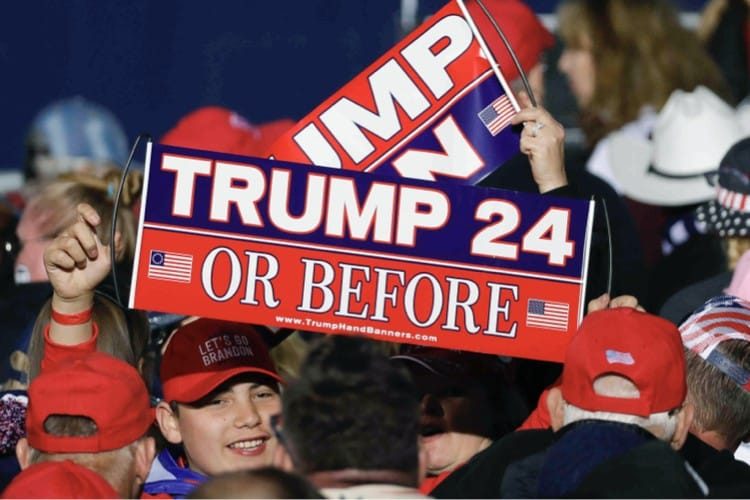
This isn’t the Koch Brothers’ GOP.
The Republican Party is currently undergoing a transformative period. The lingering influence of Donald Trump and the organized efforts of his allies and supporters to purge the 45th president’s opponents from the party is paying dividends, with many former GOP power brokers gradually falling into irrelevance.
Fourteen top GOP consultants and operatives from around the country spoke to Axios about the party’s shifting landscape. In particular, they explained the way in which primary races have changed since 2014 — the last pre-Donald Trump midterm election and the last midterms in which a Democrat occupied the White House.
The operatives, who said they work with clients ranging from extremely pro-Trump to establishment, explained who the former and the new key players are in four areas: institutional upheaval, endorsements, conservative media, and donors.
According to these individuals, the entities that formerly held sway in the party were: The U.S. Chamber of Commerce, the NRA, the Koch Network, Heritage Action, the Drudge Report, National Review, and groups such as Tea Party Express, FreedomWorks, and the Senate Conservatives Fund.
The new dominant figures are: Donald Trump, Tucker Carlson, family and aides to Trump, Fox News, Club for Growth, the Daily Wire, Breitbart News, Steve Bannon, Susan B. Anthony List, and online influencers such as Ben Shapiro, Candace Owens, Joe Rogan, Dan Bongino, and Charlie Kirk.
U.S. Representative Marjorie Taylor Greene (R-Ga.) was also listed as a major power broker in today’s GOP.
This change in the “who’s who” of Republican politics didn’t take place overnight. Rather, it has been a gradual outgrowth of the 2016 election. During that cycle, much of the institutional GOP worked against Donald Trump. The weight they thought they carried evaporated when it became clear Trump didn’t need their support to cruise to victory in the primaries and then in the general election.
“You wouldn’t know that these groups were paper tigers — unless you ever ran against one of them,” one party operative said.
The Koch network, once the kingmaker of the Republican Party, has largely fallen from grace as far as its ability to influence conservative voters.
The Koch operation was once so vast that it was basically a parallel GOP. For years, it was the norm for Republican candidates to pitch themselves at Koch retreats.
But President Trump succeeded by breaking with Koch dogma, opposing the open borders and free trade policies the Koch brothers have traditionally championed.
Moreover, David Koch died in 2019 and Charles Koch is 86, making for weaker leadership within the Koch network.
Then there’s the Chamber of Commerce. Back in 2014, “Chamber Republicans competed against “Tea Party Republicans.” The Chamber’s goal has been to elect “business-friendly” politicians, which typically translates to free trade and flexible immigration policies.
As Axios notes:
A Chamber endorsement was the gold standard and came with an expectation of meaningful outside financial support. These days, most Republicans in primaries — including establishment figures — want to stay as far away from the Chamber as possible.
… But its late-cycle political advertising — broadcast buys in the pivotal weeks before voters go to the polls — declined dramatically, from more than $35 million in the 2014 cycle to under $6 million six years later.
… During the past year, the Republican Party has effectively banished the Chamber for its increased support of Democrats. House Minority Leader Kevin McCarthy has said he wants nothing to do with the Chamber if the GOP flips the House. And even establishment GOP primary candidates are steering clear of it.
… “If the U.S. Chamber of Commerce calls you and says ‘we want to endorse,’ You’re like, ‘please don’t,’” said a GOP consultant who works for some of the country’s highest-profile Republicans.
Even the NRA has lost much of its influence. While having an NRA endorsement is still seen as a positive, a long trail of financial and management struggles has left the organization deprived of the money and organizational power to be a game-changer in politics.
Media personalities such as Tucker Carlson and Steve Bannon have become very consequential. The latter has played an enormous role in guiding the institutional Trumpian takeover of the Republican Party by touting Dan Schultz’ Precinct Strategy, under which Trump supporters are encouraged to join their county Republican Executive Committees in order to elect Trump-aligned party leadership.
The shifts in the power balance are a good thing for MAGA World. The question is, will it result in long-term structural change capable of restoring constitutional government?


